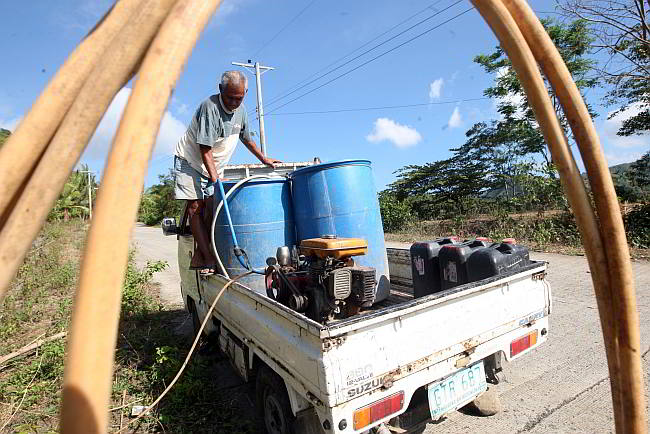
Farmers in barangay Sudlon II, Cebu City shown here stocking up on water in this April 9, 2015 file photo. The City Agriculture Department says the rains that fell in the mountain barangays allowed farmers to plant some crops.
In anticipation of tomorrow’s school opening in all levels, the Metropolitan Cebu Water District (MCWD) urged its consumers to store enough water.
“For owners of dorms, boardinghouses and apartments, as part of your climate change adaptation, please install water tanks to ensure you can store enough water for your occupants’ use,” the MCWD advisory read.
The government-owned water district usually gets 33,000 cubic meters of water daily from the Jaclupan Dam in Talisay City.
But this year, it hit an all-time low of 10,000 cubic meters per day.
Of the MCWD’s over a million consumers in its service area, only 40 percent are enjoying 24/7 water supply due to the ongoing dry spell.
Special prayer
“MCWD is encouraging all to use water wisely. Reuse, recycle, conserve. Let us all do our share,” its advisory said.
About 2,000 families in various barangays of the cities of Cebu and Talisay have been suffering from water scarcity due to the increase in temperature caused by the El Niño phenomenon.
Cebu Archbishop Jose Palma recently issued an oratio imperata or a mandatory prayer as the occurrence of rain remains elusive.
READ: Palma urges faithful to pray for rain
The special prayer for rain will be said after communion in all Masses in the archdiocese.
An oratio imperata is a Catholic tradition where the bishop leads the community in prayer for a special intention.
The state weather bureau Pagasa predicted that the rainy season this year would be delayed and that temperatures could still climb higher as the El Niño phenomenon continues to prevail.
The Cebu Provincial Board (PB) placed the entire province of Cebu under a state of calamity due to declining water supply caused by the dry spell which is expected to last until January next year.
Budget
In Cebu City, the City Agriculture Department (CAD) asked for a P22-million budget to enhance the city’s water supply and for fertilizers for farmers in upland barangays hard hit by the El Niño.
“Actually that’s the product of (last month’s) Water Summit,” Cebu City Agriculturist Joselito Baclayon said.
He said the P22-million budget can either be charged to the city’s calamity funds since the Cebu City Council already declared the mountain barangays under State of Calamity or it can be funded by a Supplemental Budget.
“This budget is for water [and] fertilizers to help the plants cope with the intense heat so they won’t wither and die,” Baclayon said.
He said some farmers are now starting to plant vegetables as some rainfall is experienced in the mountain barangays.
“The temperature is getting lower and suitable for planting, especially corn and ginger and some vegetables,” he said
Catchment
He said they are also coordinating with the Metropolitan Cebu Water District (MCWD) to set up mobile siphon tanks (MST) in order to provide potable water to the mountain barangays.
“We finished the design and the estimates for the water catchment basins and are waiting on the Bids and Awards Committee (BAC) to sign the papers of the program and the estimates for the project’s cost,” Baclayon said.
He said the initial plan is to install six water catchments in every mountain barangay in Cebu City.
Baclayon said one catchment basin measuring 100-square meters is estimated to cost P60,000.
Baclayon said their office allocated nearly P10 million to fund the catchment basins in 31 mountain barangays in the city./With Correspondent Nestle L. Sumilla

